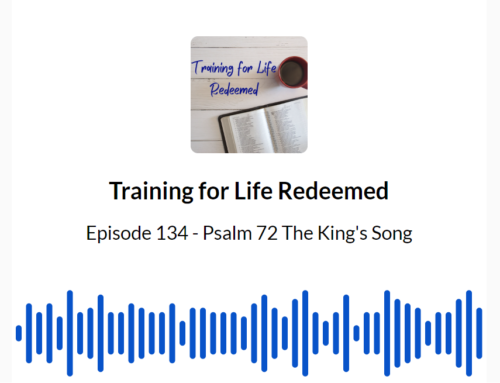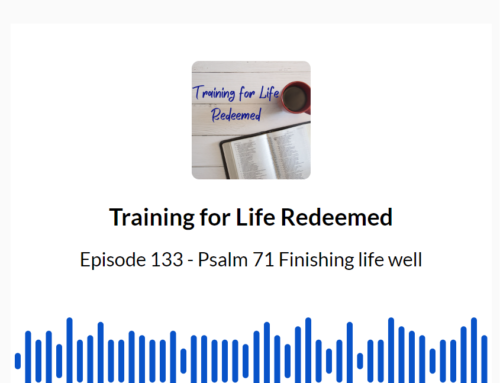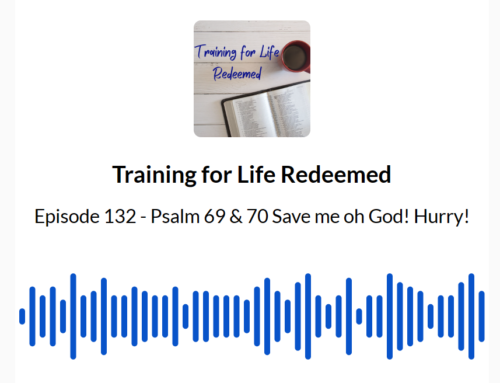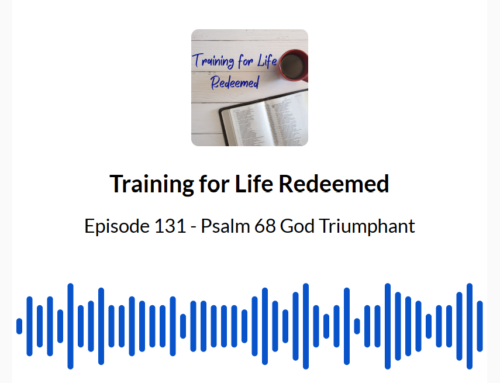Grab your notes for this episode by completing the form
and we will send you the link to all our notes.
This is the song you sing when you’re really, really depressed. And you climb on your heavenly Father’s knee and let it all out because he loves you and he has it all under control.
Dan: (00:00)
Hi everyone, and welcome to Training for Life Redeemed. We are back for this year, although there has been an episode out already, but I was not in that one. , Dad did an introduction to Psalms. Dad is currently writing books on Psalms, and he’s done a really great introduction for how should go about reading Psalms. If you missed it, it is only a podcast episode, so there’s no YouTube video for it just on our podcast. So make sure you go and listen to that to get an idea of what we are doing as we go through Psalms. Now, Dad, it’s great to be back for the year to be talk, looking at Psalms. I think Psalms is going take us most of the year, I think this year. Good Psalms. They’re so diverse. They’re very deep. They’ve got lots of things to discuss for sure that are in them. Today we’re starting with Psalm 42 slash 43. Yep. so for some reason you think Psalm 42 and 43 are the same Psalm? Yep. So we’ll talk about that in a sec.
David: (01:02)
Psalm 42, 43 for the director, a Maskil by the sons of Korah, like a dear longing for a stream of water. So I long for you, oh God, I thirst for God the living God. When will I come and appear before God? My tears have been my food day and night all day they say to me, where’s your God? These things I remember and I pour my life out to myself. When I passed over with the crowd, I walked slowly to the house of God with the sound of the yelling and thanksgiving and the roar celebrating the festival. Why are you depressed, self and howling over me? Wait for God, because I will praise him again. Wait for the salvation of his face. My God, my life is sliding down on me. I remember you. The sound of your rapids comes from the land where the Jordan flows down.
David: (01:58)
The Hermon ranges from the mountain where the trickles are. Then the sound of your rapids goes from deep to deeper. All the waves and billows break over me by day. Yahweh commands his covenant faithfulness at night. A song is with me, a prayer to the God of my life. I will say to God, my rock of refuge. Why have you forgotten me? Why am I walking in darkness under the oppression of an enemy. While slaughtering my bones My enemies abuse me by saying to me all day long, where’s your God? Why are you depressed, self and howling over me? Wait for God, because I’ll praise him again. He’s the salvation of my face. My God. Deliver judgment for me are God and argue my case against an unfaithful nation from a man of deceit and wickedness. Rescue me for you’re God of my protection. Why do you reject me? Why do I walk about in the dark, in the oppression of an enemy? Send your light and truth. Let them lead me. Bring me to the mount of your holiness, into your dwellings. Then I’ll come to the altar of God to God, the joy of my celebration. And I’ll praise you on the liar. God, my God. Why are you depressed self and howling over me? Wait for God, because I will praise him again. He is the salvation of my faith. My God.
Dan: (03:27)
Why are we starting halfway through? Well, let’s not really halfway through. It’s 42 songs into the song book .
David: (03:35)
Yeah.
Dan: (03:36)
Why are we starting there? Let’s go with that.
David: (03:37)
. Okay. So the Book of Psalms follows a sequence. I think often we look at the book of Psalms and go, somebody’s just randomly thrown a bunch of songs together and, you know, given them numbers and who knows why this one comes after that one. well, one of my , my one of my lecturers from back in the day, wrote this brilliant book, which is wandering around here somewhere, on the Flow of the Psalms O. Palmer Robertson, if you want to go and look at it. And he’s done an amazing job of observing the sequence that takes us through the Book of Psalms. So in Book one, you’ve got this contrast between, God’s king in the world. and in book we’re starting in book two. There’s five books of Psalms. we’re starting in book two because that’s where the king issues the summons to call people to come.
David: (04:32)
And it basically, the kingdom of God is here, repent. The kingdom of God has come. So this is the gospel call, and all the stuff around it, is building on the consequences of whether you accept that call or you don’t. So I thought we’ll start, we’ll start with book two starts, which is pretty much down in the mud and the blood. you know, and, ye it’s a pretty miserable place to start, but then it builds us up as we come to get to know this king that God has sent to save us. So I thought that’d be a good place to start. it’s not your happy clappy land. it it’s the, it’s the difference between, I, I think being in a, a sort of a fantasy world Christianity, where you sort of got your head up in the clouds and you try not to think about what’s down here, where you’re actually dealing with reality. and so this is the kind this, this song, these songs are the songs of people who are right in the coal face of life. and I like just that sense of reality.
Dan: (05:46)
Ye I remember when I was at college, I actually did Psalms twice, because that’s what allowed me to do the second subject on Psalms. I had to do the first subject on Psalms works that way. But I found it slightly amusing in that, in there, in that I had assignments to do. One of the assignments was to read the same book , which was nice for me. Yep. I got to do the same book review thing as my assessment task, slightly different, what I said about them in each one. But I found it interesting that the lecturers that I had for H one one lecturer was telling me, that’s just randomly put together and, you know, doesn’t really matter. Well, there’s, there’s not really a structure to it and ignore these little heading things. They’re not really part of the Bible. And then the next lecturer I had was very much a no, that’s very much constructed and put together in this way.
Dan: (06:33)
And yes, those titles are inspired. Word of God. Yeah. And I was like, okay, very big differences of opinion here. So tell me, Dad, you seem to say it’s structured right? Yep. I, I would agree to, if you look at Psalms, it’s very clear that they are not in chronological order. No. it’s very clear that there are clusters of particular types of Psalms for sure. you know, all David psalms are in one little group. They’re spread out according to what these kind of, what the point is he is making. And so that’s what you’re saying, which he’s got O. Palmer, there he is. O Palmer Robertson, says as well. Is it, there’s this structure to Psalms. Yeah. Right. So that’s good. What about these little title intro things, Dad, for the director a maskil by the Sons of Korah, apart from the, who are the Sons of Korah, but is that actually the Bible or is that just something that someone’s put in there for us?
David: (07:30)
That’s, that’s in the original text. So when you look at your English Bible, they put that in italics at the top. And it looks like the editor has stuck it on, but it’s in the Hebrew. And if you look at the Hebrew there, , there’s
Dan: (07:42)
One in the
David: (07:43)
Hebrew. Is it? There’s first one in the Hebrew. Yeah. And so we’ve sort of chopped out verse one, put it in italics, like it’s optional. It’s not, it’s there to tell us, that this is grounded in people and in places. And if you, in a couple of places where you go from Psalms of David to No Heading to a Psalm of David, in between you’ll see that they’re put together according to whatever the theme is. in this case, it looks like Psalm 42 ended where Psalm 42 ends, and then some, somewhere along the line we’ve added a verse to the song.
Dan: (08:19)
Mm. Okay.
David: (08:20)
And they’ve added that verse later on. And that later on one is Psalm 43. So, and if you know anything about writing songs, particularly Christian songs, people love to come along and add their own verses to it. . yeah. And sometimes we even have examples where a psalm that was sung in this context has been edited a little bit to sing in a different context. Yeah. And it’ll be the same one. So this is one song, and it takes us through a sequence of settings where you suffer this emotion.
Dan: (08:53)
Right. And so Sons of Korah wrote 42, may not have written 43, but 43 is definitely the same song because it repeats the same refrain. . Well,
David: (09:03)
Sons of Korah were the descendants of Korah. Yeah. whom David appointed to write songs and look after music. So this could be the Sons of Korah three generations later.
Dan: (09:14)
Yeah. Right. It could be three weeks later, , or three weeks later it’s like, oh, wait, I have this awesome verse to add, . Yeah. Yeah. Okay, Dad. So now Psalm 42, 43. Yep. It’s where we’re starting. It starts off with very famous kind of, yeah. Bit about, you know, being a deer panting for water.
David: (09:36)
Sounds very spiritual.
Dan: (09:37)
That’s right. Yes. It’s like, oh, yes, but
David: (09:40)
Yes, I’m longing for God
Dan: (09:40)
what that actually captures. You know, I, I work on a, I’ve got a mini farm a bit, you know, to see my animals panning for water is not actually a good sign normally means they’re pretty much no
David: (09:50)
Dying
Dan: (09:51)
Dead.
David: (09:52)
No Australian farmer looks at that and thinks of lovely spiritual longings. This is not romance. Mm-hmm. , you know, this is life and death.
Dan: (10:00)
Yeah. And the rest of the psalm definitely communicates that we’ve got so much in here that indicates that this person is struggling with life, to say the least. Like to say the least. They’re struggling. They can’t find their water, they’re thirst, thirsts, these things. I remember I pour out my life. Like, it’s just lots of really clear downtroddenness, this try kind of at the bottom of your Life.
David: (10:25)
This is the song you sing when you’re really, really depressed.
Dan: (10:29)
Okay. So I’m depressed. Life sucks. And I go to Psalm 42,
David: (10:35)
And you’ll find a way to take that whole, take all of your thinking and all of your emotions and climb onto God’s knee and just unload the lot. Yeah. And for Christian people, and I, this is why I start here. We don’t think it’s safe to do that. So our custom of, you know, I don’t want to say anything wrong to God, you know, I write my prayers out before I pray them. God is our father and he’s calling for a relationship where you can climb on his lap and spill your guts. And he already knows how you feel. He already knows what’s going on. He’s in charge of the whole thing. This is where you’d be honest with God, and where you trust him that he’s big enough to handle your particular mess, and knowing that he’s in charge of it. So this guy’s asking some really tough questions. and it’s, I I think this is like, you know, Job could have sung this song. Yeah. You know, your big, your big brother hates country and Western music. Right. , one of the struggles I have is what, what kind of music would you set a song to? I think Sam would set this to country and Western. country and Western music, he summarizes as, “my truck broke down, the dog died, and my wife ran off.” , you know, all of life
Dan: (12:00)
and it hasn’t rained for a week.
David: (12:01)
And it hasn’t rained for a week. Yeah. So it’s, you know, and it’s that kind of a thing that says, I’m here. I’m trying to trust you. I’m trying to be faithful. I, this isn’t punishment. I haven’t done anything terrible. Mm. You know, and even if I did do something terrible, you’ve forgiven me. We’ve dealt with all of that. Why is my life going down the toilet? Why when I cry out to you, do I not get an answer? Why am I sitting here at two o’clock in the morning bawling my eyes out and can’t go to sleep and just rolling around in bed thinking all these terrible thoughts and wondering why. And then I tell myself, and God’s not accountable to me. So what’s the point of asking why , you know, where am I going with all of this? And this is the song that says, well, let’s take all that boil and volcano and all those thoughts, and let’s put ’em in a harmonic where you recognize that God knows how you feel.
David: (13:05)
Mm-hmm. . and that, that, that brings me to this, this idea that, and I love this idea when, how do you train your emotions? You know, I’m a disciple of God. I’m following Jesus, which means I can change my behavior, I can change the way I think. But how do you change the way you feel? And I think the answer is the Psalms, because what’s happening there is God is showing you what he feels about what’s going on for you. Yeah. And that’s good news. So the, the God I serve took flesh came into this world and he feels my pain, he feels my everything. You look at Jesus in Gethsemane. Yeah. He could sing Psalm 42, 43. You know, when he gets on the cross, I, I like the, you know, he’s on the cross. He’s nailed to a piece of wood. He’s dying, he’s been tortured there. There’s barely a breath left in him. He can only get out the first line of a song.
Dan: (14:10)
Yeah. But he does go for a song.
David: (14:11)
But he goes for a song. He wants you to know what this feels like. Hmm. and that’s your song. And it’s his song. And he’s singing your song on
Dan: (14:21)
Your behalf.
David: (14:21)
Yeah. On your behalf to God. and that tells me both that God understands, and it tells me that this is how I need to tune my thinking and my feeling in so that I’m in a harmonic with God and we are on the same frequency. Yeah. but there’s a lot going on in these songs,
Dan: (14:45)
And it’s that element too, of having a relationship. Like you’re, you are my Dad. I don’t, don’t wanna come to you and read what I’m gonna say to you, . I think you’d get pretty cranky with me if I did that. I might send you a letter if I’m far away. Yeah. Which is kind of like that. But
David: (15:01)
If the only way you could talk to me was to put it in writing mm-hmm. , that would mean that our relationship was in a bit of a bad place. Yeah. You know, you couldn’t face me with the words. You’d have to put it in writing and send it. Yeah. You know, I, I’ve been in relationships where that’s the, you can’t safely face-to-face. You’ve gotta write it out. Yeah. I don’t want that with my kids.
Dan: (15:24)
No. And that’s not the way that God relates to us. He’s not the person to be, I mean, you should be frightened of him in one sense, but not in that sense. No. Like, he wants that relationship with you where you are coming to him and just giving him everything, like everything that’s going on, everything that’s pulling you down. And, you know, it can be your doubts, it can be things you’re struggling with in life. It can be the injustices that you see, all that stuff. Yeah. And he’s just like, ye bring it to me. That’s what I’m here for.
David: (15:53)
And Christians go through this and I think we focus on our feelings, and we think, well, you know, I shouldn’t be feeling this. I should be loving God and praising God and all that stuff. And I think sometimes what we do is when we are down, we sing praise and worship as they call it. Yeah. And that’s a way of getting our mind off our troubles, but we don’t actually bring the troubles. Yeah. and the, the Book of Psalms
Dan: (16:20)
Brings the Troubles
David: (16:20)
Brings the troubles. It’s, I mean, we don’t sing these songs when we meet as a church, we sing the, you know, the more acceptable stuff.
Dan: (16:31)
Yeah. and you don’t really have a relationship if all you do is talk about the happy stuff. No. If you think about your friendships in life and your family and all the rest of it, if all you ever do is talk to them about the good things, then that’s not really a strong relationship. That’s like, that’s what you do with your acquaintance. You’re like, oh mate, you, how you doing? Are I’m doing good? Yeah. You’re wearing, I’m okay. ,
David: (16:51)
You’re wearing a mask. Yeah. Yeah. Well, I think there, there are times when I go back in history when people corporately sing a much wider range of emotions than we do in church. And the Book of Psalms does that for us. and this song, you know, I, these things I remember and I pour my life out to myself when I passed over with the crowd. He’s remembering good times of worship. But then he’s coming back and saying, so why are you depressed? Well, I’m depressed cause my life is, all these things are happening and they’re bad things and I haven’t done anything wrong and I can’t fix it. And I’m talking to God and he’s not answering me. And it’s two o’clock in the morning and then he keeps, there’s this refrain every five verses. Yeah. He’ll come back and say, what are you doing , , two o’clock in the morning? What are you doing talking to yourself? Talk to God,
Dan: (17:48)
Or even like, know that knowing that God’s there. Like, it’s that trust element of, you know, why, why am I depressed self, it will come back to where I’m worshiping God. Yes. Like, and this is, you know, this is real relationship talking to God. And then you, you’re like, yeah I’m in the hard bit at the moment, but I know God, I will get back to this point where I’ll be able to worship him again. Yeah. I’ve just gotta keep coming to him with this stuff and . Yep. I’m, and trusting him and going, come on Jesus. You, you’re here with me. Right. , stop talking to yourself. Talk to God even. Yeah. He doesn’t answer you. He will . Well Dad, thank you so much for giving us a few insights into Psalm 42, 43. if you guys would like to come and grab the study notes for this psalm, you head over to trainingforliferedeemed.com/99 cuz it’s our 99th episode. Next week is episode 100. We’ll be looking at Psalm 44. We look forward to seeing you then.



